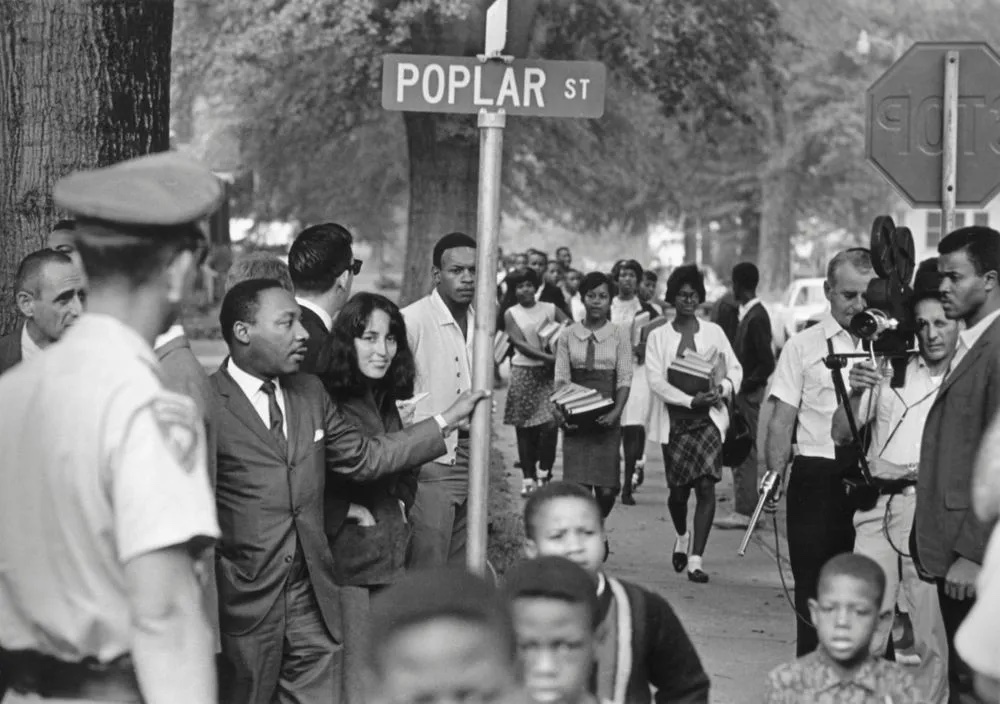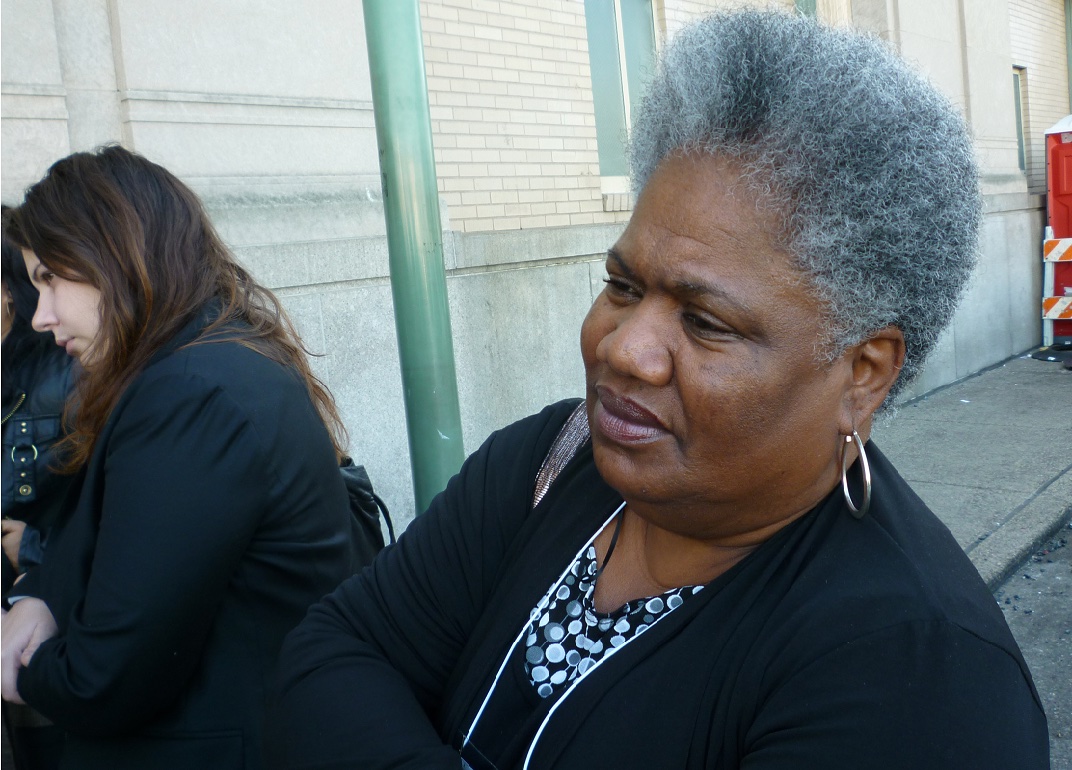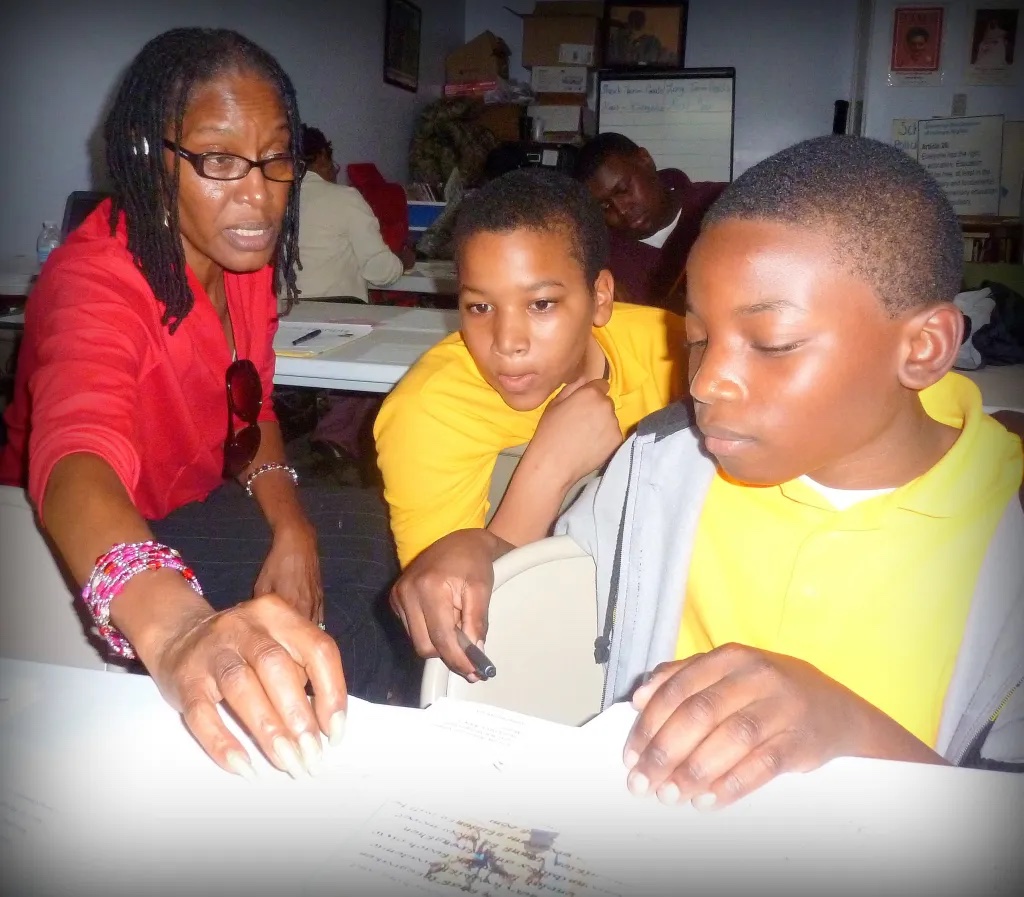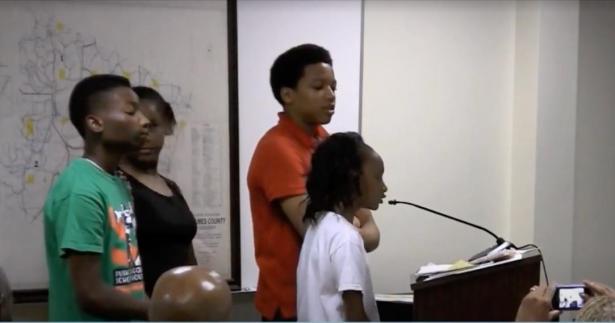On a Tuesday morning three years ago, Julia Ringo discovered her daughter was in terrible pain. Examining her, Ringo looked in shock at a mass of bruises and swelling on her daughter Kiorey's buttocks, a day after the 8-year-old Black girl had been paddled with a wooden board at an elementary school in Grenada, Mississippi.
Ringo rushed her daughter to the emergency room and told the attending doctor what had transpired. "As soon as he looked at her behind, it was like he couldn't even look at it," she says, breaking down in tears. "He just took a deep breath, felt on her butt to see was it swollen. She was screaming." Kiorey's injuries were so severe, Ringo said, that she had to stay home the rest of the week.
Ringo also reached out to someone else: Dianna Freelon-Foster, a lifelong resident of Grenada. In 1966, as a 15-year-old high school student, Freelon-Foster helped integrate the Grenada public schools. "The principal sent me and other students into a sea of angry white men who had bricks and pipes and stones" to vent their wrath over the school's integration, Freelon-Foster told MindSite News.
When she and the others were ordered to leave before lunch on the first day of school and the door was locked behind them, the white mob attacked, injuring some of them severely. "We were hit with pipes or whatever they had in their hands," she recalls. "We were told 'that was not our school, n—gers go home.'" The tensions in the town were so high that civil rights leader Dr. Martin Luther King, singer Joan Baez and others traveled to Grenada to help support the students.

On the left in Grenada: Dr. Martin Luther King and Joan Baez; Dianna Freelon-Foster is in the second row of girls in a sleeveless top and a flowered skirt. (Courtesy of Zinn Education Project.)
Today, as the founder and director of Activists with a Purpose Plus, based in Grenada, Freelon-Foster advocates for students at school disciplinary hearings. She also served as mayor of Grenada in 2004 and 2005. To her, the beatings and disproportionate use of force against Black children like Kiorey, even today, is a continuation of the historical racial violence that has been perpetrated against Blacks starting in the days of slavery. "For me, corporal punishment is violence," she said. "How can corporal punishment be thought of as reasonable?"
Freelon-Foster counseled Ringo and her family on their options in regard to the paddling. She also helped them testify in a virtual Capitol Hill briefing last June in support of banning corporal punishment in the schools.
While few Americans probably realize it, this kind of physical violence is still legal in the public schools of 19 states and in private schools in 48 (in the latter, every state but New Jersey and Iowa). Such beatings are disproportionately meted out to Black students like Kiorey, as well as to Latinos.
Black girls like Kiorey are paddled at three times the rate of white girls, and Black boys are hit at school at twice the rate of white boys, according to a 2019 report by the Southern Poverty Law Center and the UCLA Center for Civil Rights Remedies. In one-fifth of school districts in Mississippi and Alabama, Black children are five times (500%) more likely to be hit than white kids, according to another report, which mapped school paddling data across school districts.
Corporal punishment in the schools has been denounced by all major medical, psychological and child advocacy agencies in the United States. But in states where school corporal punishment is legal, educators are rarely held accountable for injuries, physical or emotional. Mississippi law states that educator use of corporal punishment "does not constitute negligence or child abuse," even though the state explicitly prohibits corporal punishment as a form of "maltreatment" in other settings that serve children, including foster care and child care facilities.
A little-known study shows striking links between racial violence and corporal punishment in schools. "We find that corporal punishment is more common for all students in areas with histories of lynching, and especially more likely for black students in these area schools," concluded the authors of a study published in 2021 in the journal Social Problems.

Dianna Freelon-Foster, founder and director of Activists With a Purpose Plus, in a 2011 photo. (Courtesy of Friend of Justice.)
Freelon-Foster recognizes how those outside threats also helped shape the use of corporal punishment in the homes of some Black families for generations, including in her family. Though she rejects its use outright and is working in Mississippi to change that mindset, she understands that its use by some Black parents at home has underpinnings in real fears about how perceived missteps by their children in the outside world could jeopardize their safety. The thinking is, she explained, "We don't want you in jail, and we don't want you dead, because we know what you may face when you go out into the streets." However, she reports that her center is making headway in enlisting Black parents in a movement to rethink home punishment and to end corporal punishment in our public schools, which 168 countries have already done.
The dangers of corporal punishment
The Grenada School District recommends corporal punishment — inflicting physical pain as a form of discipline — as an option to punish children for a long list of "infractions" including making "loud noises in the hall," using items "that cause distraction" such as fidget spinners, or carrying a book bag or fanny pack that "is neither plastic, nor clear in color, nor mesh, with or without wheels," according to the district's handbook. (Contacted for comment about its corporal punishment policy and Kiorey's paddling, the Grenada school district did not respond.)
Although instances of corporal punishment in schools in Mississippi and other states have declined from 1.5 million schoolkids a year in the late 1970s, nearly 70,000 children were subjected to physical punishment in the 2017-2018 academic year, including some under the age of 5, according to the latest data available from the U.S. Department of Education's Office of Civil Rights. In many cases, the same children are hit repeatedly throughout the school year. Moreover, many teachers and coaches do not report all their paddlings, according to reports by Human Rights Watch and others.
School paddlings are typically administered with a wooden board measuring 18 inches long, 4 inches across and ½ inch thick, explained Elizabeth Gershoff, a professor at University of Texas at Austin, as she held up a paddle at the Capitol Hill briefing on corporal punishment last June. "If an adult wielded such a paddle against another adult, we would call it a weapon," she said. (The typical school paddle is a replica of paddles developed to beat slaves.)
The use of physical punishment sometimes results in bruises, lacerations, nerve and muscle injury, whiplash damage, and broken bones, according to research published in 2016 in the journal Social Policy. News reports underscore the severity of the injuries that can result. In 2011, a 15-year-old boy in a Mississippi school was beaten so hard with a paddle that he fainted and fell head-first onto a concrete floor, breaking his jaw and knocking out five teeth. In 2013, a Dayton, Texas, principal fractured and dislocated a boy's tailbone during a paddling that left his backside covered with blood, a TV station reported. And last year, In Florida, a principal was caught on video hitting a crying six-year-old girl with a wooden board, even though corporal punishment at school was illegal in her district.
Such physical abuse is also widely recognized in scholarly research as one of 10 types of childhood traumas that puts people at greater risk for depression, suicide, domestic violence and other serious conditions in adulthood.
Corporal punishment in the schools is concentrated in the Deep South and scattered states in the west and midwest. In nearly all southern states, Black children are more likely to be hit than white children.
Harsher punishment of Blacks
Although some U.S school districts urge discretion in physical punishment — the Calcasieu Parish school board in Louisiana advises consideration of the age, size, sex of the child, and "the ability to bear the punishment" — opponents of paddling scoff at this notion.
"I don't know how an administrator can assess a student's ability to endure pain," says Tate Aldrich, an educator and founder of Arkansans Against School Paddling, who has seen similar language in school handbooks in Arkansas.
In addition, implicit bias in education distorts the perceptions of how well pain is endured, experts say. During slavery, they note, Blacks were widely seen as insensitive to pain — a myth that has persisted to this day.
Racial bias and false beliefs that Black people are able to endure more physical pain plays out in health and medical settings, for example, where Black patients receive less pain medication than white patients, according to a paper in the Proceedings of the National Academy of Science. In disparities that the authors of another article in JAMA Pediatrics called "striking," Black children had one fifth the odds of receiving opioid pain medication for pain as white children who were rushed to emergency rooms for appendicitis.
A study from the Center of Poverty and Inequality at Georgetown Law examining adult perceptions of Black girls, entitled Girlhood Interrupted: The Erasure of Black Girls' Childhood, finds that Black girls were perceived as needing less nurturing, protection and support than white girls, and as being "less innocent." The authors concluded: "In light of proven disparities in school discipline," the authors concluded, "we suggest that perceptions of Black girls as less innocent may contribute to harsher punishment by educators."
Organizing against school beatings
That cultural norm of corporal punishment at home was part of Jeffrey Burton's upbringing. Burton did not question it when he first was assigned to be the person paddling students at a rural school in Arkansas where he was dean of students, he explained on a recent podcast about corporal punishment. "Parents, grandparents, aunties, uncles, never hesitated to give the green light to corporal punish a kid. So in the office, I would go in and out, play an executioner, if you will — I would go in and paddle the students," said Burton, who is now a board member of Arkansans Against School Paddling.
But Burton, who is Black, says that once he saw that it was a trend that students who looked like him were sent more often for paddlings, "I thought, we have got to change this practice." In particular, a 5-year-old Black girl was sent to Burton to receive two swats with the wooden paddle because she refused to do her work. "At that moment, I was like, 'No.' This isn't clicking, hitting this child is not going to make her do her work; if anything it is going to have adverse effects. She's going to lose a love for wanting to be in school; she's going to fear me as an educator, fear her teachers. That's not what education is about."
That scenario is exactly what Kiorey experienced after her paddling, says her mother. "She was scared to go to sleep. She had nightmares. She didn't want to go back to school," says Ringo. "That's all that she could think about."
Ringo, who moved with her child to Fort Smith, Arkansas, after the paddling, wishes she could go back and relive that day. As a parent, she had been given two options: Kiorey could be paddled or she would be suspended for three days. Worried about her daughter losing valuable instruction, she gave permission for her to be paddled, which she deeply regrets. "I always tell the school under no circumstances should my child be hit. I don't care what a child did. No child should be hit like that."
Ellen Reddy, executive director of the Nollie Jenkins Family Center in Durant, Mississippi, and a transplant from rural Georgia, observed that fear and terror up close when she first stepped into Mississippi schools some 20 years ago. "It was scary. You could walk into the school building, you could hear children crying, you could hear people using boards on children. Everybody was walking around with a board under their arm, in their hand. It was just too much."

Ellen Reddy, executive director of the Nollie Jenkins Family Center in Durant, Mississippi.
It was a far cry from Reddy's own experience growing up. She grew up on her grandparents' farm in a community in rural Screven County, Georgia, "where children were cherished; we were the treasures of the community," she said. Black people and white people came together during the harvest to make syrup and trade food. Her grandparents, she explained, sheltered her and the other children from seeing the "whites only" and "colored only" signs dotting the streets in other locales. And although the school she attended did use corporal punishment, she was never hit.
What she and others saw in Mississippi schools led Reddy and colleagues at the Nollie Jenkins Family Center — which is named after her grandmother — to launch a campaign to end corporal punishment in the local school district, beginning in the early 2000s. Youth trained in leadership skills through the center stood up before the Holmes County School Board demanding an end to beatings at school.
"I felt embarrassed, ashamed, belittled, worthless," said sixth grade student Curshevia Robinson to the school board in 2014. The teacher, she explained, grabbed her by her uniform shirt and took her to her desk and paddled her in front of the entire class. "While she was paddling me, she called me all kinds of names, like ugly and dumb, and she told me that I am worthless, and I wasn't going to be anything when I grew up," she said, struggling to hold back tears. Unable to continue talking, a fellow student read the rest of her statement. "After she paddled me, she told me not to tell anybody about it. If I did, she said she was really going to get me."
The Holmes County School District banned corporal punishment in 2018, and pledged to begin training teachers in positive behavioral interventions.
Reddy and the Nollie Jenkins Family Center have expanded their work statewide, and the Mississippi Coalition to End Corporal Punishment, which they started, believes that it's going to take federal legislation that threatens to cut funding to schools that continue corporal punishment to make a real difference.
For that reason, Reddy supports the federal bill HR3836, Protecting Our Students in Schools Act of 2021, which would withhold federal funding to schools that refuse to ban corporal punishment against students. It also includes funds to train local education agencies in nonviolent ways to discipline students.
"Even the civil rights movement required federal legislation," she says. "I think they can make a decision to end corporal punishment. At least it will create a pathway for it to end." She also supports federal legislation known as the Counseling not Criminalization Act, which would remove police officers from schools and provide funding for mental health support.
Ringo and her daughter Kiorey are comfortable in their new home in Arkansas, where Ringo says her daughter is happy and thriving in school. "Basically, she's a straight A and B student. She loves school. Her teachers love her," says Ringo proudly. But Ringo's mother lives back in Grenada, which is an emotional pull for her. "Every time I talk about going back, Kiorey says she wants to go visit. But she doesn't want to go back to that school."
(This story originally appeared at MindSite News.)
Laurie Udesky has been a reporter and editor for more than 25 years, reporting on mental health, social welfare, health equity, and public policy issues. She is a former associate editor of Southern Exposure, the print forerunner of Facing South.
Facing South is the online magazine and weekly email update of the Institute for Southern Studies, featuring investigative reporting and in-depth analysis of trends across the South. Facing South has earned a national reputation for exposing abuses of power, holding powerful interests accountable, and elevating the voices of everyday people working for change in the South.


Spread the word